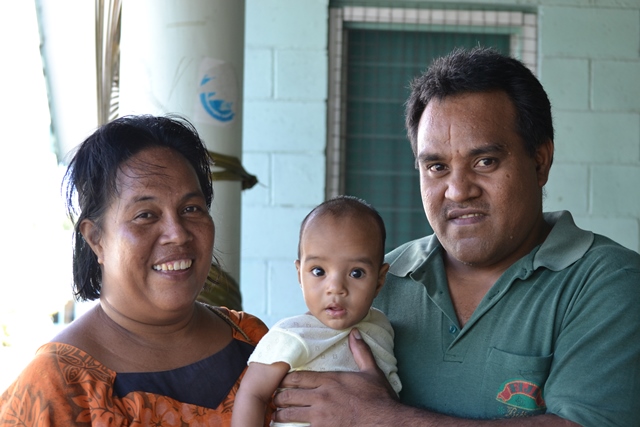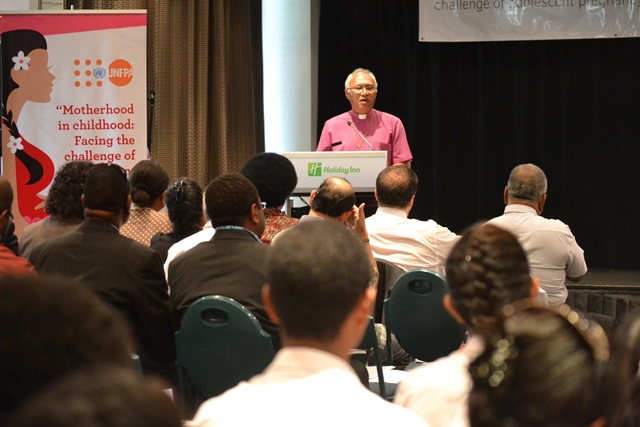September 18, 2014 - HAVING faith or the belief in a higher power is (almost) a default setting for the majority of those who people the small island nations in this ocean of islands we inhabit.

Prior to affirmation the world did not end at the horizon and the consequential influx of exploration fleets into the South Seas, island communities practised their own versions of spiritualism.
Remnants of these are practices and narratives which reflect an innate connection between the people and natural elements, kept in perpetuity by spoken word(s) in traditional and indigenous communities.
Language is also a map of early migratory patterns, as most Pacific nations will attest to. Spoken word or language is an aspect of life that may not be acknowledged enough for its critical role as an adhesive for humanity's diverse groups of people. Without language, one can witness a progressive erosion of age-old practices for language is an anchor if you will, of one's identity, cultural or otherwise.
Generally-speaking, the global linguistic diversity has never been more threatened as it is today. We would have lost by the turn of this century about 6000 languages, the biggest loss was within the last 30 years, perhaps a bad omen for a critical vehicle in development work.
The critical role language plays in people's collective progress was a recurring theme in the recent Building a Faith-Inspired Movement to Support the Sexual and Reproductive Health Agenda in the Post-2015 Development Agenda meeting held in Turkey (Istanbul, June 2014).
The 60 leaders of faith-based organisations which met in Istanbul shared their experiences, challenges, strategies and priorities to strengthen their respective work and collaborations to advance rights and dignity for all. Effective communication, mindful of the language that is used underpinned many suggestions of strategic approaches in the areas of gender-based violence, HIV and AIDS, maternal health and family planning and sexual and reproductive health education and religious leaders.
Participants who discussed maternal health and family planning spoke of the difficult position as clergy when having to address issues like family planning including accessibility to modern contraceptives for young unmarried couples. Some groups for example found the very term contraceptives objectionable.
This consideration was however viewed with an acknowledgement that communities' needs were "high and real and it is critical to shift faith-based leaders' priorities from a dominating preoccupation with purity to people's health needs and rights".
Participants discussed and acknowledged the cost of inaction - 70,000 adolescents in developing countries die annually of pregnancy and childbirth complications, that 95 per cent of the world's births to adolescents occur in developing countries as 19 per cent of young women in developing countries become pregnant before their 18th birthday, that girls under 15 account for two million of the 7.3 million births that occur to adolescent girls under 18 every year in developing countries and the list goes on - alluding to the difference faith-based organisations could make if they were to effectively engage with their communities on issues like maternal health or family planning.
For Pacific Island nations, some of which are heterogeneous societies, the duality of an individual's existence alludes to how influences to one's decision-making processes, for the most parts, continue to be the three-legged stool of state, religion and tradition. In this context, the importance of language in development work particularly in relation to sexual and reproductive health and rights issues cannot be overemphasised.
Participants at the Istanbul meeting acknowledged as a successful strategy the need to recognise what informed people's worldview for effective approaches: "Understanding how people conceive of their relationship to the world and what their values are allows for constructive approaches to making meaningful changes in attitudes or behaviour."
Some faith-based organisations leaders shared best practices like a book of recommendations for Friday sermons on 52 issues including HIV and AIDS, developed by the Ministry for Religion in collaboration with faith leaders in Tajikistan. Another is the use of social media in Malaysia as a platform for conversations between women who had contracted HIV from their migrant worker husbands or the inter-faith collaboration to develop training and interactive materials for issues such as HIV and AIDS.
Faith-based actors, particularly religious scholars could actively contribute to making history horrendous facts like 222 million women of child-bearing age in developing countries still cannot access contraceptives, though they express a preference for it. Faith-based actors could translate human rights concepts into theological language for example, that could then be utilised by clergymen and women.
"The United Nations Population Fund (UNFPA) has supported participants to these meetings with the hope that as members of the global faith-based organisation leadership, the Pacific can also benefit from approaches that are working in other places which we could use here, recognising how much religion still influences decision-making processes of people in the region, especially young people," UNFPA Pacific Sub-Regional Office director and representative Dr Laurent Zessler said.
"UNFPA has always had a policy on working with faith-based organisations. In the Pacific we believe very much that the effective partnership of the tripartite - governments, civil society and faith-based organizations - is critical for regional sustainable progress, the right language is key."



